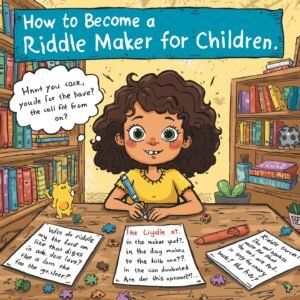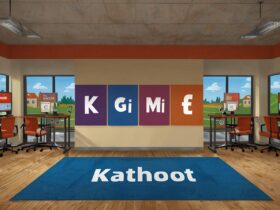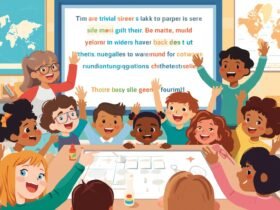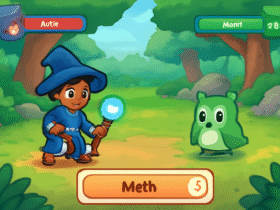Kids’ riddles are a really good means to occupy a young mind and help it develop critical thinking ability and creativity. Riddles can come in handy whether you want to entertain kids or teach them some problem-solving skills. This paper will examine the importance of riddles, how riddles may be beneficial to children, and give a few examples that children will appreciate.
The Value of Riddles to Kids
Riddles are a very old form of adding an enjoyable challenge to the idea of exercising the brain and solving problems. They educate them in more ways than they entertain, and a set of cognitive and emotional skills is developed. Now, we shall consider some of the major items that make riddles good for children:
Cognition Booster
When children are asked riddles, they need to think critically, analyze the facts given to them, and then provide conclusions. This assists in enhancing their capacity to handle informationproblem-solvingem solving and think out of the box. Riddles for Kids stimulates the child to use his mind every day, and this makes the child more adept at schoolwork and real-life situations.
Promotes Language Development
Riddles are many times riddles involving wordplay, creative use of language, and mischievous wording. By solving them, children are incited to better cognize language. They also indulge in the study of synonyms, homophones, metaphors, and so on, and these activities develop their vocabulary along with the knowledge of the structuring of language.
Enhances Social Interactions
Riddles help to relate to friends or family members. Children can work or guess individually to solve riddles or, in turn, ask their fellows riddles. This develops verbal skills, cooperative spirit, and tolerance when they await the solution or start communicating in order to solve a riddle that may prove quite difficult.
Stimulates Creativity and Imagination
A lot of the riddles are imaginative or nonsensical in a manner that causes children to think in a way that they may not have previously. This type of imagination allows children to solve problems in a more imaginative manner, which is one of the most important skills and is not limited to solving riddles.
Learns to be patient and persistent
Other riddles are simple, whereas others take some time and effort to overcome. Kids become familiar with the concept of not quitting after a problem is encountered. They learn to deal with frustrations better and that a lot of times things only work after a lot of tries.
The types of riddles for the kids are as follows:
Riddles are very varied affairs, some involving wordplay and others more complicated games. The following are some of the common types of riddles, and they are good for children:
Classic Riddles
These are the conventional kinds of riddles that frequently work with wordplay and puns. They may be easy or more complicated, and that is what makes them adaptable to kids of varying age groups.
Example:
When I was young, I was tall, and when the old people get old, they are small. Whatever I am now. Clergy male deacons priests priests priests priests priests priests male clergy whatever I am now
A candle.
Animal Riddles
Animals are always popular with kids, so this type of riddle is always a success. These riddles tend to explain the features of animals without referring to them by name
Example:
I have wings and do not fly. I have a beak and I cannot eat. What am I?
The answer is a penguin.
Number Riddles
Number puzzles are good in terms of helping kids brush up on their math knowledge, as well as being fun to do. Such riddles usually concern simple addition or reasoning riddles
Example:
I am an odd-numbered American without an E. I am even. How many?
Answer: Seven.
Word Riddles
These riddles are based on wordplay, including rhyming words, different definitions of words, or similar sounds etc. Word riddles make kids put language to the test.
Example:
What has keys that are not able to open locks?
An instrument.
Thinking Out of the World Riddles
These riddles entail thinking out of the box. They can be tough initially, but after you comprehend the solution, you find out that the solution was straightforward.
Example:
It is a picture of a man pushing a car through a roadway. He arrives at a hotel and screams, “I am bankrupt!” Why?
He is playing Monopoly.
How to Become a Riddle Maker for Children

Children learn quite well when we introduce riddles to them. Bringing enjoyment to this experience can be done by following the given steps:
Start Simple
Start with simple riddles, which children can answer in the very short run. This will make them feel good about themselves and push them to do harder ones. As they get more confident, it is possible to make it a bit more difficult.
Make it interactive.
Present riddles in an interesting form. You can make a mini game, a reward, or an appreciation of the correct answer. It makes the activity more fun and convincing Riddles for kids to join the activity.
Foster Group Play
Riddles are also an excellent means of entertaining two or more kids at the same time. They can solve a riddle together or ask each other riddles. This leads to team building and communication.
Make Fine Visual Aids
In some cases, pictures can be used to assist children with riddles. You can have a picture or a diagram that brings understanding to the question, which is a riddle.
Make It Interesting
It is not the idea to pressure the kids with riddles, but to make it all light and joyful. Glorify the respective answers, and also endeavor to make the experience positive.
Riddles For Kids: The Examples to Try
With the explanation of the significance of riddles, it is time to provide some examples of riddles you can play with children of various ages.
Younger Kids
These riddles are not too difficult and provide answers that one can guess.
I am not alive, and I roll and I roll. So, what do I do?
Ball.
What has hands but cannot clap?
A timepiece.
What has a face without being able to smile?
A clock.
What goes up and Domin, but never comes down?
Your years.
The Older Kids
These riddles need a little more thinking and logic.
I always have to eat; I always need to be fed. The finger, which I touch, will soon be red. What then am I?
Answer: Fire.
Which thing can go round the globe and remain in the corner?
The answer is a stamp.
Answer: Fire.
The less you see, the more of this there is. What do you mean by that Setting by that What is What do you mean by is it? What do you mean by that What is it
Answer: Darkness.
FAQs for Riddles for Children
What makes riddles good for children?
Riddles are useful in improving critical thinking in children language development creativity, and problem solving skills. They are fun interactive and engaging and the child can learn and build patience and perseverance.
How old can the children be to start solving riddles?
Simple riddles can be presented to children at the age of 3 to 4. To keep them entertained as they age, you can do so by using trickier riddles as they advance in age.
Are riddles applicable in the classroom?
Yes! In classrooms, riddles are often used by teachers as a means of getting students involved in learning. They also contribute to the formation of cognitive skills, leveling of vocabulary development, and teamwork.
Do all kids have riddles?
Riddles are an enjoyable activity that most children love to solve if they are good at the appropriate level. That is why a riddle should not be too hard; otherwise, it can make a child lose motivation. One should begin with less complex riddles and then move on to the more complex ones.
What are the benefits of using riddles to train the thinking ability of my child?
Riddles challenge the mind to think logically and creatively. Kids are made to consider problems from different angles, thus improving their problem-solving skills.
Are riddles a way of teaching such subjects as math or science?
Absolutely! Riddlescano mixes in different topics such as math, science, and history, and thus makes children learn concepts enjoyably and unforgettably.
Conclusion: Why Riddles Present a Good Objective to Kids
Riddles for Children are a great method of Encouraging them to be creative develop their Problem Solving ability and improve their usage of language. They also ensure Learning is fun through Interaction that helps Children achieve crucial cognitive and social skills. As a parent, teacher, or caregiver, you can introduce riddles in the daily routine of a child so that he or she gets more out of learning. That is why, whenever you want to keep youngsters occupied the next time round, riddles will come to the rescue and enhance their brainpower!

















Got a Questions?
Find us on Socials or Contact us and we’ll get back to you as soon as possible.